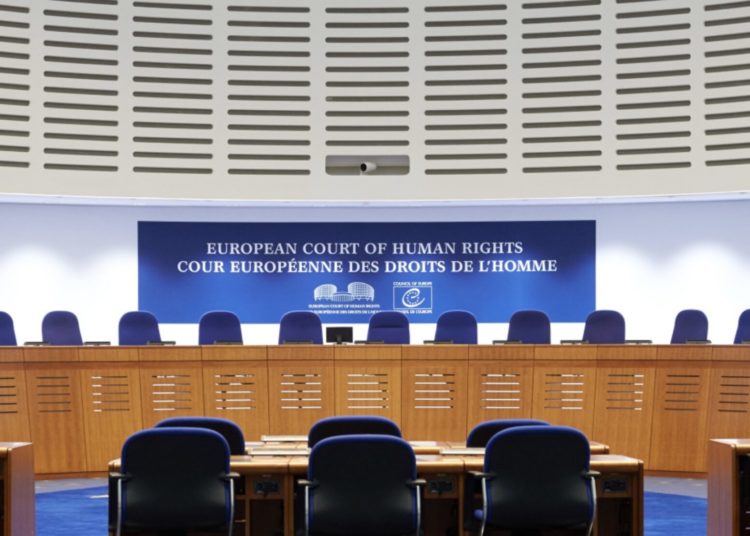Levent Kenez/Stockholm
The European Court of Human Rights (ECtHR) issued a landmark decision on September 26, 2023, ruling that the conviction of Yüksel Yalçınkaya, a teacher in Turkey, on charges of terrorism, which included using a mobile phone app and having an account at a specific bank, was unlawful. This decision could have significant consequences for thousands of people facing similar charges in Turkey.
However, in a recent turn of events, during a retrial that started last week following the ECtHR’s judgment, the Kayseri 2nd High Criminal Court made the controversial decision to revisit the same evidence, seemingly disregarding the ECtHR’s ruling.
Security at the courthouse was high, preventing Yalçınkaya’s family members and several lawyers who went to Kayseri to follow the retrial from accessing the courtroom.
Adding to the intrigue, a woman who had previously filed a complaint against Yalçınkaya was now called as a witness in the proceedings. Despite expectations, the court decided to adjourn the trial to September 12.
Experts view the court’s decision to revisit procedures already addressed in Turkey’s ECtHR defense, procedures that had been thoroughly examined by other institutions, as a strategic move by the government, possibly aimed at prolonging the legal process.

The Turkish government accepted such activities as having an account at Bank Asya, affiliated with the Gülen movement, a group critical of the government; serving in an administrative position at a Gülen-linked institution; subscribing to the group’s publications; being a member of a trade union or other institution linked to the Gülen movement; and using the ByLock encrypted messaging application as benchmarks for identifying and arresting tens of thousands of followers of the Gülen movement on charges of membership in a terrorist organization
On March 21, 2017 a Kayseri court had sentenced Yalçınkaya, who is still incarcerated, to more than six years in prison on conviction of terrorist organization membership based on his alleged use of the ByLock messaging app and having an account at Bank Asya.
However, Ankara’s political approach to ECtHR decisions and its use of them as a bargaining chip in its relations with EU countries is nothing new. During budget discussions in the Turkish parliament last November, Foreign Minister Hakan Fidan responded to questions, stating that Turkey chooses not to implement decisions from the ECtHR for political reasons. Fidan asserted that Turkey ranks among the member states with the highest percentage of ECtHR decisions implemented but noted that certain cases have become symbolic and politicized, causing difficulties in their implementation.
Fidan informed his European counterparts that approaching these cases politically would elicit a political response. He cited this as the rationale behind Turkey’s decision not to implement ECtHR decisions.
Ankara is not implementing the decisions of the ECtHR regarding businessman Osman Kavala and Kurdish politician Selahattin Demirtaş, as well.
The Council of Europe’s Committee of Ministers considered further action during its June 5-7 2023 meeting in the event Turkish authorities did not release Kavala, who has been in prison since October 18, 2017 despite a 2019 ECtHR ruling that deemed his detention in pursuance of an “ulterior motive,” that of silencing him as a human rights defender.
Meanwhile, the Parliamentary Assembly of the Council of Europe (PACE) held an urgent debate in Strasbourg on October 13, 2023 during which they called on Turkey to adhere to the binding judgments of the ECtHR and to release Kavala. They underscored that this case undermines “the credibility of the organization.”
In a resolution based on a report by Austrian deputy Petra Bayr, PACE expressed its disappointment with Turkey for failing to release Kavala despite a clear judgment from the ECtHR in 2019 that called for his immediate release.
Furthermore, PACE highlighted that Kavala’s aggravated life sentence was upheld in September 2023. The Strasbourg court had previously determined that there was no credible evidence to support the charges against him and that his detention was aimed at silencing him, categorizing him as a “political prisoner.”
In light of this PACE believes it’s time to urge member states to pass “Magnitsky legislation” or other legal measures to sanction Turkish officials responsible for Kavala’s illegal detention if his release doesn’t take place.
Additionally, PACE mentioned its ability to challenge the credentials of the Turkish delegation in its 2024 session if Kavala was not released by January 1, 2024.
However, PACE did not take any action in this regard.
On September 22, 2023, the Committee of Ministers of the Council of Europe declared that the ECtHR had found violations regarding the fair trial of Kurdish politician Selahattin Demirtaş, calling for his release.

Demirtaş was arrested on November 4, 2016, on charges of forming an organization with the intent to commit a crime and membership in a terrorist organization.
On May 28, 2023, following his re-election, Turkish President Recep Tayyip Erdogan delivered a victory speech, saying Demirtaş would never be released as long as he was in office, while his supporters chanted “Death penalty for Demirtaş.”
Opposition groups in Turkey criticize the EU for not exerting enough pressure on Ankara for the implementation of ECtHR decisions.












